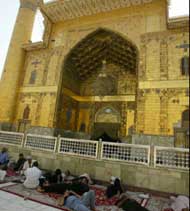|
Najaf Clashes Flare Again, Shrine Talks Suspended
 |
|
An American soldier atop a tank patrols the deserted streets of Najaf
|
NAJAF,
Iraq, August 22 (IslamOnline.net & News Agencies) - Heavy clashes
erupted between US troops and Shiite fighters in the Iraqi holy city
of Najaf Sunday, August 22, after the proposed handover of Imam Ali
shrine to the Shiite religious leadership was suspended.
Fighters
loyal to Shiite leader Moqtada Al-Sadr launched multiple attacks on US
tanks, parked around 300 meters (yards) away from the Imam Ali shrine,
as the reverberations of gunfire and mortar bombs could be heard from
inside the mosque compound, reported Agence France-Presse (AFP).
Overnight,
US warplanes pounded the city, causing three large explosions near the
mausoleum, as the US army confirmed military operations were
continuing at the request of the Iraqi government.
American
troops backing Iraqi forces in Najaf had scaled back their deployment
Saturday, August 21, but an AFP correspondent said Sunday's clashes
were more intense than the sporadic firing the previous day.
In
the southern cities of Basra and Amara, clashes also flared between
British-led forces and the Mehdi Army overnight, with patrols and
occupation bases coming under small arms and mortar fire.
Talks
Suspended
Some
two days after spokesmen for both Sadr and Grand Ayatollah Ali
Al-Sistani announced the deal to hand over the keys to the shrine,
talks bogged down.
“We
do not know how long it will take. It all depends on the situation and
Sistani,” Sadr's junior spokesman Sheikh Ahmed Al-Shaibani told AFP
in Najaf.
“The
matter is suspended as of now, because we are awaiting the response
from Sistani about forming the committee” tasked with carrying out a
full inventory of the shrine's priceless works of art and alms.
Sistani
has been reluctant to take back the shrine without ensuring that
nothing is missing and the Mehdi Army is unwilling to surrender
control amid any suggestion of impropriety.
In
a letter circulated in Najaf late Thursday, August 19, and signed by
the firebrand Shiite leader, Sadr urged his followers to hand over the
shrine to the Shiite leadership (Al-Marjiyah or hawaza in Arabic).
The
move also came a few hours after interim Prime Minister Iyad Allawi
made a "final
call" for Sadr to disarm his militia, withdraw from
Imam Ali Shrine or face a massive onslaught.
Stumbling
Block
 |
|
Shiite fighters rest in front of the Iman Ali shrine (AFP)
|
The
priceless treasures which have lain for centuries in the mausoleum at
the shrine of Imam Ali in Najaf are proving to be a stumbling block
for mediators trying to end the crisis.
Sistani's
office accepted an offer by Sadr Friday, August 20, to take control of
the shrine to bring an end to the face-off with US forces since August
5.
But
it has stipulated that before it takes control, an inventory must be
carried out to make sure the treasures remain in place and intact.
“The
mausoleum contains many items and priceless treasures, which no-one
except the Waqf knows the value of," Salah Abdelrazzak, general
manager of Waqf, the Shiite religious endowments body, told AFP.
He
gives the example of one of the caves beneath the mausoleum which
contains gifts from kings, emirs and leaders of Arab and Muslim
countries.
“Crowns,
swords, jewels, precious stones, gold and silver vases, sumptuous
carpets, crystal chandeliers,” are all among the valuables, he said.
“When
you talk about keys, it is not just the one key but a whole bunch of
keys for the outside doors, the strongrooms where the treasures are
stored and for the mausoleum itself where pilgrims leave offerings of
money,” he explained.
With
a surface area of 15,000 square meters (3.7 acres), the mausoleum has
five massive exterior doors guarding the entry to the tomb of Imam
Ali, the son-in-law of Prophet Muhammad (PBUH).
“One
of the sets of keys was stolen five months ago by the Mehdi Army from
one of the guardians of the mausoleum, Raduan Al-Rufai, as he was
closing up for the night. Since then, we have no idea what has
happened to the treasures," Abdelrazzak said.
The
Rufai family, one of the pillars of Najaf society, have been guardians
of the site and keepers of the keys since being appointed by the
Shiite religious authority, the Marjayia, in 1845, according to AFP.
The
keys have been handed down from generation to generation.
The
last “kilidar”, or keeper of the keys, living in Iraq was Haidar
Al-Rufai, murdered in the mausoleum in April 2003, along with Abdel
Majid Al-Khoi, descendant of Iraq's most authoritive ayatollah, Abul
Kassem Al-Khoi.
Moqtada
Al-Sadr is accused by Washington of being an accessory to both
killings.
Raduan
Al-Rufai was brought back from London, where he had lived for 23
years, to take his cousin Haidar's place but since the theft of the
keys, he has lived incognito in Baghdad in the hope of escaping the
same fate as his cousin.
Since
the start of the clashes with the Americans, the Shiite fighters have
used the edifice for a variety of purposes -- as headquarters, as a
hospital, press centre, resting place for fighters, a meeting point
and a place of prayer.
“We
deplore this abuse of the most holy Shiite site by the Shiites
themselves,” Abdelrazzak said.
|